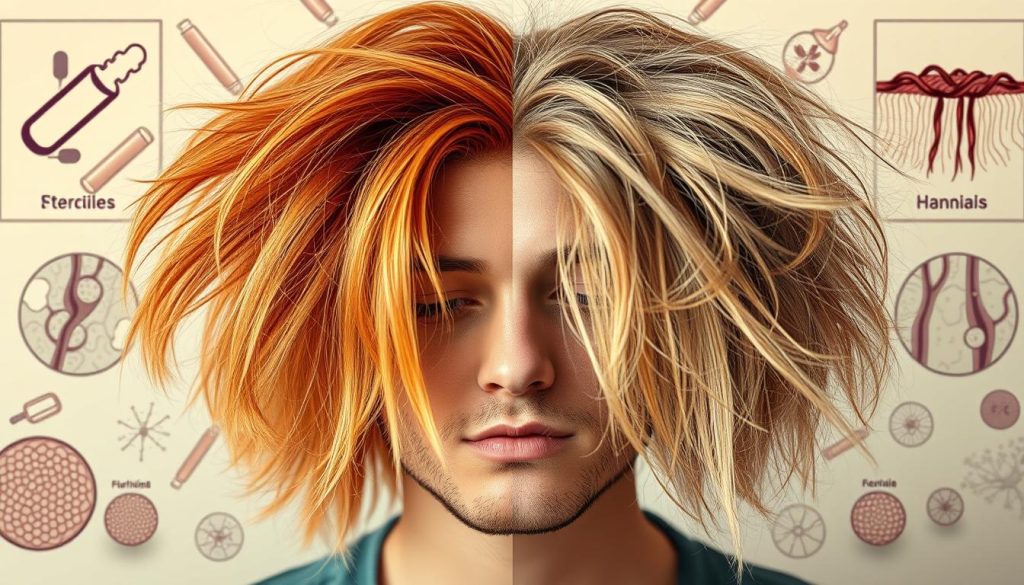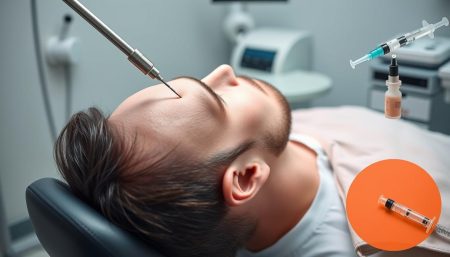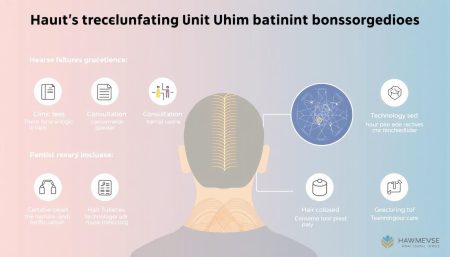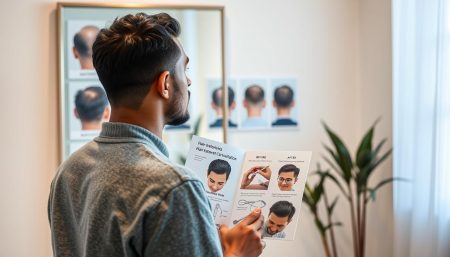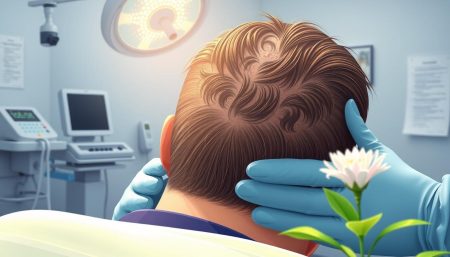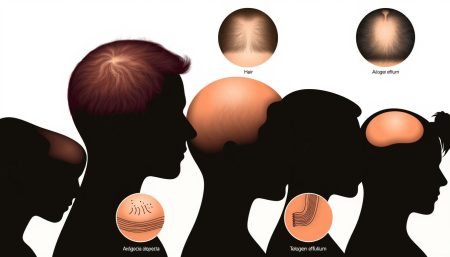Hair loss can be upsetting, and knowing why it happens is key to fixing it. If you’re losing hair, iron deficiency might be the reason. Yes, iron is crucial for healthy hair, and not having enough can cause hair loss.
Spotting iron deficiency symptoms early can help a lot. If your hair is thinning or you see more hair in your brush, think about iron. We’ll explore how iron affects your hair and what you can do to keep your hair healthy.
Key Takeaways
- The link between iron deficiency and hair loss is well-established and cannot be overlooked.
- Understanding how iron deficiency can lead to hair loss helps in early detection and effective treatment.
- Maintaining adequate iron levels is essential for hair health and overall well-being.
- Kicking off a regimen of prevention or treatment is easier with accurate knowledge about iron deficiency symptoms hair loss.
- Early diagnosis and intervention can greatly improve hair loss conditions due to iron deficiency.
Understanding Iron Deficiency and Its Importance
Iron deficiency is a big problem worldwide, affecting health in many ways, including hair. It’s important to know what causes it, how to spot it, and its role in our bodies. This knowledge helps tackle issues like iron deficiency anemia hair loss.
What is Iron Deficiency?
Iron deficiency happens when we don’t have enough iron. This can lead to anemia, where we don’t have enough healthy red blood cells. These cells are key for carrying oxygen to our body’s tissues. Symptoms include feeling tired, looking pale, and hair loss, as studies show.
Roles of Iron in the Body
Iron is vital for many body functions. It helps make hemoglobin, a protein in red blood cells that carries oxygen. It’s also key for energy and a strong immune system. Plus, iron keeps our cells, skin, hair, and nails healthy, showing why iron deficiency anemia hair loss is a concern.
Identifying Iron Deficiency
Spotting iron deficiency can be tricky, as symptoms vary. Look out for tiredness, weakness, cold hands and feet, and hair thinning. Blood tests check ferritin levels, showing iron stores. These tests highlight the effects of low iron on hair and other important body functions, stressing the need for enough iron.
Can Iron Deficiency Cause Hair Loss?
Many people wonder if iron deficiency symptoms hair loss is the main cause of their thinning hair. It’s important to understand how iron affects hair health.
Iron is key for making hemoglobin, which carries oxygen to cells. This includes cells that help hair grow. Without enough iron, these cells might not work right, leading to hair loss due to iron deficiency. This can show as less hair or more shedding, which worries many.
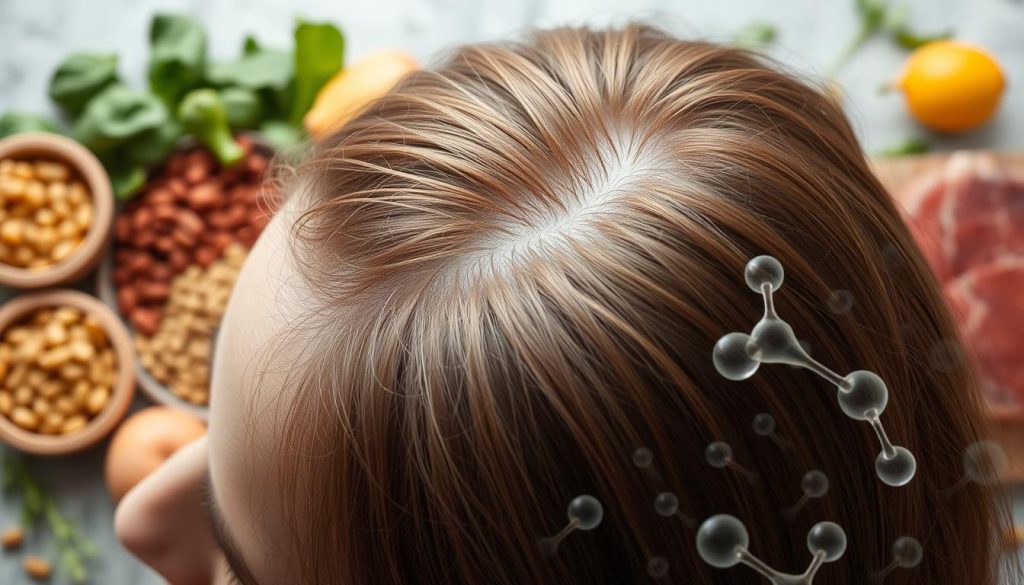
Studies show that people with iron deficiency often lose more hair. A study on women with chronic telogen effluvium found they had lower iron levels than those without hair problems.
Men can also lose hair due to iron deficiency. But, finding out if iron deficiency causes hair loss needs a doctor’s check-up. Symptoms can look like other health issues.
If you think iron deficiency symptoms hair loss might be your problem, see a doctor. They can test your iron levels and suggest treatments like supplements or diet changes.
Fixing iron deficiency can stop and even reverse hair loss. Getting enough iron through food or supplements can help make your hair look and feel better.
The Iron Hair Loss Connection: A Closer Look
Looking into the iron hair loss connection shows how important iron is for health and hair. Iron helps the hair growth cycle, from follicle health to hair quality. Knowing this helps fight hair loss caused by iron deficiency.
How Iron Supports Hair Health
Iron is key in hemoglobin, which carries oxygen in the blood. This oxygen is needed for hair growth and repair. With enough iron, hair follicles can grow new hair well.
The Science Behind Iron and Hair Growth
Iron helps cells grow, including those that help hair grow. Studies show iron helps the hair growth phase. Without enough iron, hair can thin and fall out more.
Iron helps hair follicles grow faster. Without it, hair grows slower. So, getting enough iron can help hair grow back and stay healthy.
Knowing how iron affects hair loss is key for those with thinning hair. Fixing iron levels can help hair grow back and improve overall health.
Symptoms of Iron Deficiency Beyond Hair Loss
While iron deficiency anemia hair loss is a common concern, iron deficiency has many other symptoms. These symptoms can affect your overall health. We will explore these symptoms in detail, focusing on how they relate to iron deficiency symptoms hair loss.
Iron deficiency anemia can show itself in many ways before hair loss becomes noticeable. Recognizing these early signs is key to preventing further problems and improving your quality of life. Here’s a closer look at these non-visible symptoms through a comprehensive list and detailed explanation:
- Fatigue and Weakness: This is one of the most common signs of iron deficiency. It happens because your body can’t make enough hemoglobin. Hemoglobin carries oxygen to your cells, leading to tiredness and weakness.
- Pale Skin and Brittle Nails: Iron is important for healthy skin and nails. If your skin is pale or your nails are brittle, it could be a sign of deficiency.
- Shortness of Breath: Even simple physical activities can feel exhausting if your blood lacks enough hemoglobin due to iron deficiency.
- Heart Palpitations: Unusual heart rhythms can sometimes be linked to iron deficiency anemia. This adds stress to your heart.
- Headaches and Dizziness: Iron deficiency in the brain can cause frequent headaches or dizziness.
It’s important to understand the severity and frequency of these symptoms:
| Symptom | Frequency | Impact Level |
|---|---|---|
| Fatigue and Weakness | Daily | High |
| Pale Skin | Often Noticed | Medium |
| Shortness of Breath | During Physical Activity | Medium to High |
| Heart Palpitations | Infrequent | Medium |
| Headaches and Dizziness | Occasional | Low to Medium |
Understanding and addressing these symptoms quickly by consulting healthcare providers is crucial. It can prevent iron deficiency symptoms hair loss and promote a holistic approach to dealing with iron deficiency. Here’s an illustration showcasing the internal effect of iron deficiency on the human body.
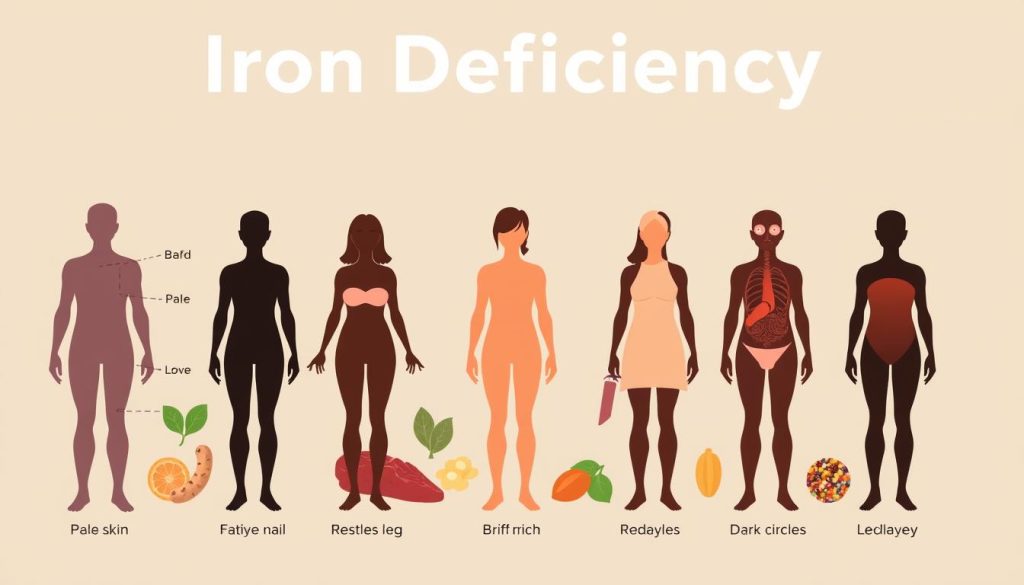
Differentiating Types of Hair Loss
Understanding the different types of hair loss is key, especially when it comes to hair loss due to iron deficiency. We’ll look at three main types of hair loss. Each has its own cause and link to nutritional issues, like iron.
Telogen Effluvium: Stress-Related Hair Loss
Telogen Effluvium is a temporary hair loss caused by stress, severe illness, or big changes in diet. It often starts months after the stress event. This is because stress can mess with how nutrients are spread in the body. Iron is important for hair growth, so not having enough can make this condition worse.
Androgenetic Alopecia: Genetic Hair Loss
Androgenetic Alopecia, or male/female pattern baldness, is the most common hair loss. It’s mainly due to genetics and hormones, not diet. But, having enough iron is good for hair health. It can make your hair look better, even if it doesn’t stop the genetic loss.
Anagen Effluvium: Chemotherapy-Induced Hair Loss
Anagen Effluvium happens fast and is often linked to chemotherapy. It’s very upsetting because hair falls out in big clumps. While it’s mainly caused by chemotherapy, your diet, including iron, affects hair growth after treatment. Keeping iron levels up might help your hair grow back faster.
If you’re losing hair because of iron deficiency, figuring out the type is the first step. Working with doctors can help you find a treatment plan. This plan will address both your hair loss and iron levels.
Iron Deficiency Anemia Hair Loss Explained
Can iron deficiency cause hair loss? Yes, iron deficiency anemia can lead to hair loss. It’s not just thinning, but noticeable shedding. Iron is key for making hemoglobin, which carries oxygen for cell growth and repair, including hair.
Without enough iron, the body focuses on vital organs. Hair follicles get less oxygen. This pushes them into a resting phase, causing more hair loss. This is especially true for those with iron deficiency anemia, a severe form with very low ferritin levels.
The extent of iron deficiency anemia hair loss depends on how long and severe the deficiency is. Restoring iron levels through diet or supplements can help hair grow back. This shows a clear link between iron and hair health.
To understand how iron deficiency anemia affects hair loss, here are symptoms at different levels:
- Fatigue and pale skin at mild levels.
- Noticeable hair thinning and increased hair loss at moderate levels of deficiency.
- Severe and chronic shedding in cases of confirmed anemia.
This shows that the hair cycle can improve and even reverse hair loss with iron supplements and a diet rich in iron. It’s crucial to treat iron deficiency early.
If you’re concerned about hair loss due to iron deficiency, talking to a doctor can help. They can offer advice and treatment options.
Iron Levels and Hair Loss: Correlation and Diagnosis
Looking into the connection between iron levels and hair loss starts with detailed lab tests. These steps are key to figuring out how iron deficiency hair loss happens. They help find the right treatment.
Understanding Lab Tests and Results
Tests for iron levels include serum iron, Total Iron Binding Capacity (TIBC), and ferritin. These tests show how much iron the body has for important tasks, like hair growth.
Interpreting Ferritin Levels
Ferritin is a protein that stores iron in cells. It’s a main sign of the body’s iron stores. For healthy hair, ferritin levels need to be just right. Low ferritin can harm hair follicles, causing iron deficiency hair loss.
| Lab Test | Normal Range | Significance |
|---|---|---|
| Serum Iron | 60-170 mcg/dL | Indicates active iron in the bloodstream |
| Total Iron Binding Capacity | 240-450 mcg/dL | Measures the blood’s capacity to bind iron |
| Ferritin | 20-500 ng/mL for men 10-200 ng/mL for women | Reflects iron stores; crucial for hair health evaluation |
To really understand iron levels and hair loss, doctors use these tests. They also look at your medical history and do a physical check. This helps them diagnose and treat iron deficiency.
Effects of Low Iron on Hair: From Thinning to Shedding
Going from healthy hair to thinning and shedding can be upsetting. It often shows iron deficiency. We need to see how low iron affects hair health.

Iron deficiency symptoms hair loss is not just about looks. It’s a sign of a bigger health problem. It starts with a few extra hairs in your brush, then more shedding.
Iron is key for oxygen in your scalp and hair growth. Without enough, hair growth slows down.
- Increased hair shedding
- Slow hair growth
- Diminished hair thickness
Hair loss can vary, but iron’s link to hair health is clear. If your hair is thinning or shedding more, check your iron levels. A healthcare professional can help you understand how iron deficiency symptoms hair loss affects you.
Audience-Focused Section: Are You at Risk for Iron Deficiency?
Knowing if you’re at risk for iron deficiency is key, especially for your hair health. This part talks about who’s more likely to get iron deficiency. It also looks into if iron deficiency can cause hair loss, which might show as hair loss symptoms.
Risk Factors for Developing Iron Deficiency
- Diet low in iron: Vegetarians and people who don’t eat enough iron-rich foods are at higher risk.
- Women with heavy menstrual periods: Losing a lot of blood during menstruation can lower iron levels.
- Pregnancy: The body needs more iron during pregnancy, which can lead to a deficiency.
- Chronic conditions: Diseases like celiac or inflammatory bowel diseases can make it hard to absorb iron.
Populations More Vulnerable to Iron Deficiency
- Menstruating Women: Women lose blood each month, so they need more iron than men.
- Infants and young children: They grow fast and need more nutrients, including iron.
- Vegetarians and Vegans: They don’t eat meat, which is a big source of iron.
- Frequent blood donors: Giving blood often can lower iron levels if not balanced with diet or supplements.
Everyone’s risk for iron deficiency is different. Finding out if iron deficiency can cause hair loss for you might need a doctor’s advice. It’s important to treat iron deficiency to avoid hair loss and keep overall health good.
Tackling Iron Deficiency: Effective Treatment Options
Understanding and using effective treatments for iron deficiency hair loss is key. There are many ways to increase iron levels and hair loss recovery. These include changing your diet, taking supplements, and sometimes medical treatments.
Each treatment aims to raise iron levels. This helps hair to grow back and improves health. Here are the main treatments suggested by doctors.
- Dietary Changes: Eating foods high in iron like spinach, red meat, and fortified cereals can help.
- Iron Supplements: Iron supplements, available over-the-counter or by prescription, can quickly boost ferritin levels.
- Medical Treatment: For severe cases, intravenous iron therapy may be needed to effectively replenish iron stores.
Table: Comparing Iron Supplementation Forms
| Supplement Form | Typical Dosage | Pros | Cons |
|---|---|---|---|
| Oral Iron | 100 mg daily | Accessible and affordable | May cause gastrointestinal side effects |
| IV Iron | Dosage varies based on deficiency | Rapid improvement in iron levels | Requires clinical administration |
It’s important to talk to a healthcare provider to find the right treatment for iron deficiency hair loss. The right treatment not only stops hair loss but also boosts overall health.

Nutrition and Supplements: Boosting Your Iron Intake
Knowing how your diet affects iron absorption is key, especially if you’re losing hair due to iron deficiency. A balanced diet can help increase your iron levels. This might reduce hair loss caused by iron deficiency anemia.
Balancing Your Diet for Better Iron Absorption
To boost iron absorption, it’s not just about eating more iron. Vitamin C and avoiding certain foods are also important. Eating foods high in Vitamin C with iron-rich foods can help. But, caffeine and high-calcium foods can block iron absorption. Planning your meals wisely can make a big difference.
Ideal Iron-rich Foods for Preventing Deficiency
Eating foods high in iron is key to avoiding iron deficiency symptoms. Here are some foods that can help keep your hair healthy:
- Red meat – particularly beef and lamb
- Leafy greens like spinach and kale
- Legumes – includes lentils, chickpeas, and beans
- Iron-fortified cereals and grains
- Pumpkin seeds
- Shellfish, particularly oysters and clams
For more on how diet affects iron levels, check out our detailed guide here.
| Food | Iron Content | Additional Benefits |
|---|---|---|
| Spinach (100g) | 2.7 mg | High in fiber, vitamins A, C, and K1 |
| Beef (100g) | 2.6 mg | Rich in protein, vitamin B12, and zinc |
| Lentils (100g) | 3.3 mg | Good source of protein and dietary fiber |
| Oysters (100g) | 6.0 mg | Loaded with zinc, copper, and vitamin D |
Iron deficiency symptoms like hair loss can be tough to deal with. But, the right diet can help improve your iron levels. For personalized advice on managing iron deficiency anemia hair loss, talk to a healthcare provider.
Iron Deficiency Symptoms Hair Loss: When to Seek Help
Hair loss can be upsetting. Knowing the link between iron and hair loss is key. Iron deficiency can lead to anemia, but its effect on hair is often overlooked.
Iron deficiency symptoms hair loss
Signs of hair loss due to iron deficiency can be subtle. Catching them early is important. Here are some signs to look out for:
- Unusual hair shedding: Losing more than 100 hairs a day might mean you’re low on iron.
- Thinning hair: Hair thinning on your scalp could be a sign of iron deficiency.
- Slowed hair growth: If your hair isn’t growing as fast as it used to, iron levels might be low.
- Fragile, brittle hair: Not enough iron can make your hair weak and prone to breaking.

If you see these symptoms, talk to a doctor. They can check if iron deficiency is causing your hair loss. A blood test can show if you have enough iron. Finding out early can help you treat it with diet changes or supplements. This might stop your hair loss and make your hair healthier.
Preventing Hair Loss Due to Iron Deficiency
Stopping hair loss due to iron deficiency needs two steps. First, keep iron levels up. Second, make lifestyle changes to keep your hair healthy. Knowing and using these steps is key for those fighting this issue.
Strategies to Maintain Healthy Iron Levels
Keeping iron levels healthy is vital for preventing hair loss due to iron deficiency. Check your iron levels with blood tests regularly. This helps you know if you need more iron from food or supplements.
Eat foods high in iron like spinach, red meat, and fortified cereals. Also, eat foods high in vitamin C like oranges or bell peppers with these foods. This helps your body absorb more iron.
Lifestyle Changes to Prevent Iron Deficiency and Hair Loss
Changing your lifestyle can greatly reduce the risk of iron deficiency and hair loss. Exercise regularly, manage stress, and eat a balanced diet. These actions help your health and iron levels.
Also, don’t overuse heat styling tools and chemical treatments. These can weaken your hair and cause more loss.
For more information, check out the link between iron deficiency anemia and hair loss. It offers a detailed look at symptoms, treatments, and how to regrow hair.
| Strategy | Benefits |
|---|---|
| Regular Iron Level Checks | Ensures timely intervention and adjustment of diet or supplements |
| Increase Iron-Rich Foods | Directly boosts iron levels necessary for hair follicle health |
| Pair Iron with Vitamin C | Enhances iron absorption in the body |
| Manage Stress | Reduces hair fall linked to physiological stress |
| Avoid Harsh Hair Treatments | Minimizes additional damage and breakage to hair |
Real Stories: Overcoming Iron Deficiency and Restoring Hair Health
The fight against iron deficiency hair loss is a personal and deep journey. Many have battled this silent enemy, learning how to fight it. Their stories of resilience and success inspire and offer practical solutions.
Each story below shows how to beat iron deficiency hair loss. They highlight the importance of diet and supplements. These are not just stories; they are lessons in managing health through informed choices.
- Lisa’s Journey: Lisa noticed her hair thinning in her early 30s. She went to her doctor, who found low ferritin levels. With diet changes and supplements, her hair started growing back in months.
- Mark’s Turnaround: Mark’s hair loss was alarming. He found his iron deficiency during a check-up. With iron-rich shampoo and supplements, his hair and confidence returned.
These stories prove that fighting iron deficiency hair loss is not one-size-fits-all. Personalized treatment, following guidelines, and patience are key. Regular check-ups and blood tests track progress and ensure hair health.
If you’re dealing with iron deficiency hair loss, remember you’re not alone. Recovery is possible with the right approach.
Conclusion
The link between iron deficiency and hair health is strong. Iron deficiency hair loss is a common problem, especially for women. It can cause thinning or even a lot of hair loss, showing a need for better nutrition.
To fix iron deficiency symptoms hair loss, we need a full plan. This includes finding the cause and treating it to boost hair growth. It’s all about getting enough iron, either from food or supplements.
A study showed how important iron is for hair. Women with hair loss had much lower iron levels than those without. Keeping iron levels up is key for hair and overall health.
For healthy hair and energy, spotting iron deficiency signs is crucial. Eating foods high in iron or talking to a doctor about supplements can help. It’s a step towards better hair and life quality.
FAQ
Can iron deficiency cause hair loss?
Yes, iron deficiency can lead to hair loss. When iron is scarce, the body may use what little it has for other important tasks. This can cause hair loss, known as iron deficiency hair loss.
What are the roles of iron in the body?
Iron is vital for many functions in the body. It helps make hemoglobin, which carries oxygen in the blood. It also supports muscle function and helps grow and repair cells, including hair cells.
How can I identify if my hair loss is due to iron deficiency?
Look for signs like excessive and diffused shedding. If you think you might have iron deficiency, a blood test can check your hemoglobin or ferritin levels.
What are the effects of low iron on hair?
Low iron can disrupt the hair growth cycle. This can make hair strands thinner, slow down hair growth, and increase shedding.
How is iron deficiency anemia hair loss explained?
Iron deficiency anemia severely depletes iron levels. It hampers the delivery of oxygen and nutrients to hair follicles. This disrupts the hair growth cycle, leading to hair loss.
What can I do to tackle iron deficiency and improve hair health?
To treat iron deficiency, eat a balanced diet rich in iron. Consider iron supplements and address any health issues. Always consult a healthcare provider for the right treatment.
Are there specific iron-rich foods that can help prevent deficiency?
Yes, eating foods like red meat, poultry, fish, lentils, spinach, and iron-fortified cereals can help keep iron levels up and prevent deficiency.
When should I seek help for iron deficiency symptoms hair loss?
If you notice unusual hair shedding, fatigue, or other iron deficiency symptoms, seek medical help. A healthcare professional can diagnose and treat you properly.
What strategies can I use to maintain healthy iron levels?
Eat a balanced diet rich in iron, take vitamin C to enhance iron absorption, and consider iron supplements under a doctor’s guidance.
Can lifestyle changes help prevent iron deficiency and hair loss?
Absolutely. A healthy diet, managing stress, avoiding over-styling, and regular blood checks can help prevent iron deficiency and hair loss.
What are the real stories of overcoming iron deficiency and restoring hair health?
Many have overcome iron deficiency and restored their hair health. They did this through dietary changes, supplements, and treatments recommended by healthcare professionals.












